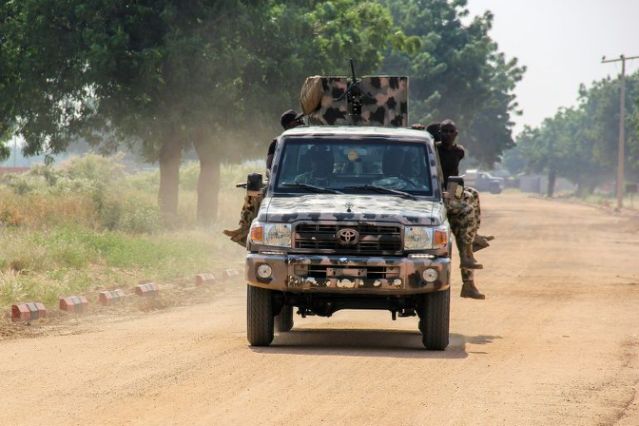By AFP
Five Nigerian soldiers were killed by Islamic State-aligned jihadists and dozens of civilians were kidnapped in a separate attack, military sources said Sunday, in the latest violence to grip the north of the country.
A military convoy was hit in northeast Borno state on Saturday, and militants also attacked a transport convoy in the same region a day before, abducting 35 people and killing one woman.
Nigeria’s Boko Haram and a splinter group, the Islamic State West Africa Province (ISWAP), have killed 36,000 people and displaced around two million as part of a decade-long conflict.
Deadly attacks and kidnappings by jihadists in the northeast and criminal gangs in the northwest have intensified in recent weeks.
Saturday’s attack on the military convoy took place outside of Mafa, 44 kilometres (27 miles) north of the regional capital Maiduguri.
“The terrorists fired an RPG (rocket-propelled grenade) on the convoy which hit one of the vehicles with five soldiers in it,” one security source said.
“All the five were killed.”
The insurgents seized two vehicles in the attack, said a second source who gave the same toll.
ISWAP split from the mainstream Boko Haram six years ago and rose to become a dominant group.
The jihadist group focuses on military targets, raiding bases, ambushing troops and planting mines on the roads, but recently they have been attacking and abducting civilians.
Dozens were kidnapped late Friday by ISWAP militants at a fake checkpoint in Garin Kuturu village outside Jakana, 25 kilometres from Maiduguri.
“The ISWAP terrorists who were dressed in military uniform stopped the vehicles… Some of the passengers fled into the bush while 35 were taken hostage,” a pro-government militia official said.
A woman was shot dead and several others were injured when the militants opened fire on those fleeing into the bush, he said.
Jakana, which lies along the 120-kilometre highway linking Maiduguri and Damaturu, the capital of neighbouring Yobe state, is an ISWAP stronghold.
Abductions of civilians by the jihadists in the area have been on the rise, prompting increased military deployments which have failed to end the abductions.
– Suicide bomber –
The attacks follow the killing of at least three people by Boko Haram on Saturday when a teenage girl blew herself up in a crowd in the town of Konduga, about 40 kilometres from Maiduguri.
The group, whose insurgency began in 2009, had already made headlines in recent weeks.
At the end of November, about 100 of its fighters slit the throats of at least 76 farmers working in a field not far from Maiduguri, the “most violent” attack against civilians this year, according to the UN.
Then on December 11 criminal gangs, known locally as bandits, abducted more than 300 children from a secondary school on behalf of Boko Haram in the northwest of the country.
The children were finally released on Friday after negotiations between the authorities and the criminal groups.
The mass abduction, which occurred hundreds of kilometres from Boko Haram’s stronghold in the northeast, has raised fears of a territorial expansion of the jihadist group.
– Alliance –
Experts have warned that jihadists have been attempting to forge an alliance with criminal gangs in the northwest, who for the past decade have been terrorising rural areas by raiding villages, stealing cattle, kidnapping for ransom and burning homes after looting supplies.
Since 2011, the violence of these armed gangs has killed some 8,000 people.
In the face of increasing attacks, criticism of the government and of Nigerian President Muhammadu Buhari has intensified.
The 78-year-old head of state, who comes from the northwest region where the so-called bandits sow terror, was elected in 2015 on the promise of ending the jihadist insurgency in the northeast.
abu/cma/erc/pma














